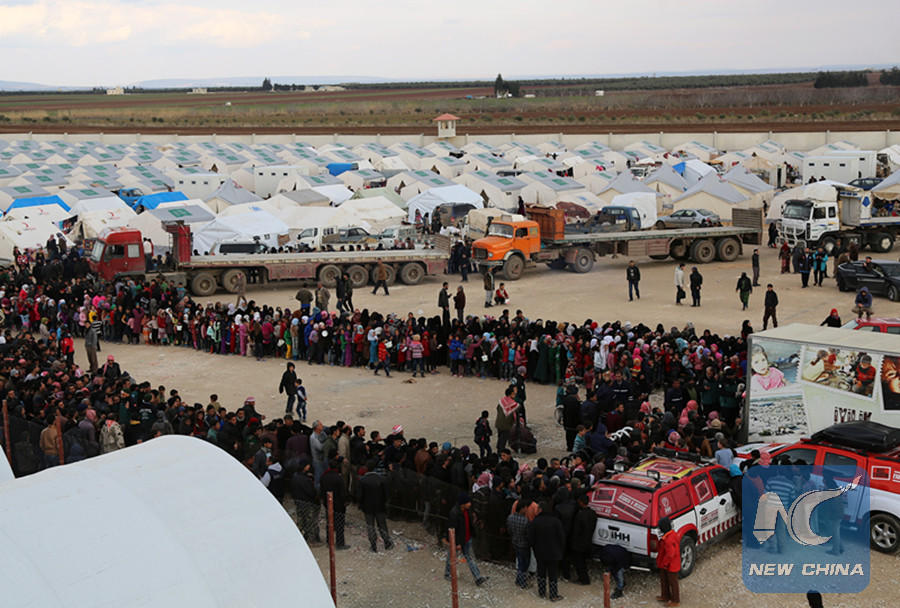
This file photo taken on Feb. 10, 2016 shows a refugee camp in Kilis, a Turkish border city grappling with a population of Syrian refugees larger than its own. (Xinhua)
ANKARA, March 1 (Xinhua) -- As Turkey continues its military operation in Syria's Afrin, a debate is heating up among Turks whether the Syrian refugees should be sent back home to fight the Kurdish fighters there.
Turkey has absorbed 3.5 million Syrian refugees over the past six years, in a display of generosity. But as the military operation continues in northern Syria, Turks are now starting to question that generosity.
Inside a tea house on the Tunali Hilmi avenue, one of popular destinations of social life in the capital Ankara, Mehmet Cimen, a building contractor, showed a cell phone picture of his son posing in commando outfit, who is one of the Turkish troops sent to Syria to fight the Kurdish fighters in Afrin.
The Turkish operation launched on Jan. 20 aims to remove the Kurdish militia, dubbed as terrorists by Ankara, from the Afrin region.
"Why don't they send the Syrian refugees here (in Turkey) to fight for their country while our boys are dying for them? " Cimen said.
MIXED FEELINGS ABOUT HOSTING SYRIAN REFUGEES
Turkey has won international applause for accepting so many Syrian refugees, but the Turkish military operation in Syria seems to have changed the attitude toward Syrian refugees among the Turks.
The International Crisis Group has said that resentment is rising against Syrians in Turkey's urban centers.
A recent report stated that violence between Turkish hosting communities and Syrian refugees has increased significantly in metropolitan areas of Turkey's big cities such as Istanbul, Ankara and Izmir.
"They should protect their country, instead of that, they live here and receive monetary assistance from our taxes," lamented Cimen, pointing out that rich Syrians live better in Turkey then they did in Syria.
In fact, a large majority of Syrian refugees live in dire conditions across Turkey. Only a minority, or about 270,000, live in the camps.
The tension was largely caused by the cultural difference and the Syrian refugees' takeover of many low-wage jobs or customers from the Turks.
Many Turks hope that the military operation in Syria would encourage Syrian refugees to return voluntarily to their homeland, marking a return of rhetoric which used to regard the displaced Syrians as "guests".
"We don't know yet how many could return after the end of the operation, but it would be several hundreds of thousands," a government official told Xinhua on condition of anonymity.
There is a total of 790,000 male refugees on Turkish territory between the age of 19 and 39, theoretically fit to fight.
A total of 32 Turkish soldiers have died in Syria since the start of the operation. This has increased the anger among some Turks who favor sending the Syrian refugees to fight in their own country.
"I am appalled that our soldiers have to die there to ensure security for the Syrians living comfortably here," a retired army colonel told Xinhua, preferring not to be named.
"We should have enforced some kind of compulsory military training for the Syrians and push them before our army on the terrain," he said.
SOME SYRIAN REFUGEES WILLING TO FIGHT
In fact, many Syrian refugees are willing to return home to joint the fight there. Hundreds of Syrian refugees have applied for voluntary military service to join the Afrin operation, local media reported.
In the central town of Konya, Muhammad Taci, a university student from Syria's Damascus, said he was ready to fight for Turkey as he felt obligated to Turkey which has offered a safe haven to him.
In Ankara's Dikmen neighborhood, home to hundreds of Syrian families, Nassim Tassar, a Syrian refugee, also told Xinhua that he was ready to join the Turkish army or a special unit if Turkey allows this.
"We have fled the war in Syria's Aleppo. My family has lost two men in the fighting. If needed, we can go again," insisted the 35-year old man.
He admitted that since the launch of the Turkish incursion, there has been a rising nationalist sentiment in Turkey, adding that he "understands" the negative opinion of some Turks toward Syrian refugees.
"Personally I have always felt as close as can be to home here and we have been well treated and if there's an opportunity to return to our city, we will," Tassar said.
Kemal Kilicdaroglu, the leader of the main opposition Republican People's Party (CHP), has caused some controversy by calling on the government to send Syrians to Afrin to fight instead of Turks.
"If President Recep Tayyip Erdogan is willing to bring a complete end to terrorism in Syria, he can train Syrians in Turkey and send them to fight there. Does it make sense for our soldiers to protect Syrian soil while Syrian teens sit comfortably back here? " Kilicdaroglu asked.
Local columnist Ahmet Hakan said he was disgusted by the fact that Turkish troops are sent to Syria to fight while Syrian refugees enjoy peaceful life in Turkey.
"It sends my blood boiling that while our soldiers die to protect these people's country, Syrians who are fit to fight have fun in our cities," he wrote in the Hurriyet daily.
His article sent a shock wave over the Turkish social media, leading to a heated debate between the Turks in favor or against Hakan's stance. Some called him being patriotic, while the others criticized him for being racist.
Hakan is not the only journalist expressing such negative opinion toward Syrian refugees.
Another article on the pro-government Yeni Safak daily also urged young Syrian refugees in Turkey to take up arms and fight alongside the Turkish troops.
"Dear young Syrian men, Turkey's soldiers are in Afrin for you, but where are you?" it questioned.

